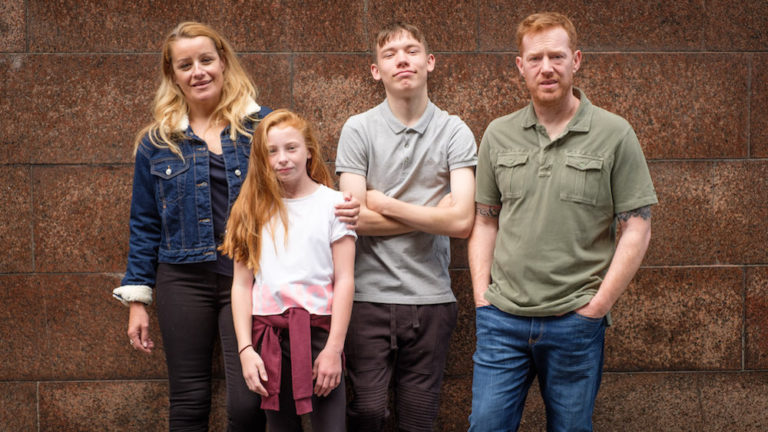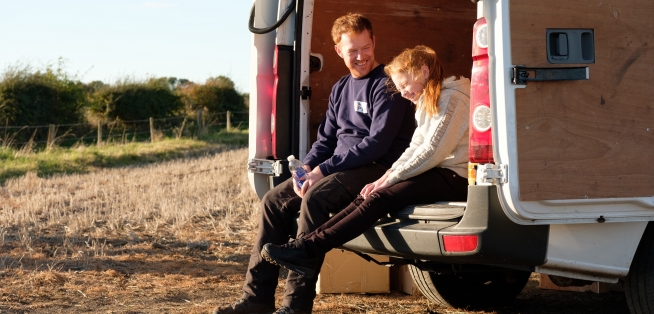Irene Tortajada, Campaigns Officer at The Poverty Alliance shares her reflections on Ken Loach’s new film.
Ken Loach has once again shed light on one of the biggest struggles of modern Britain, the rising tide of in-work poverty and insecure work brought by the massively growing gig economy. His new film Sorry we missed you is a bleak portrait of how exploitative zero-hour contracts and the gig economy can lock families in a spiral of debt and financial insecurity. This blog contains some minor spoilers.
Ricky (played by Kris Hitchen) is a former construction worker hit by the 2008 financial crisis, who has recently been “onboarded” (there is no “joining”) by a big delivery company. The firm’s hard-edged manager, Maloney (Ross Brewster) insists that by joining them, Ricky will be his own boss. He is told that by working “with” them (not for them), he will essentially be starting his own business, a franchise, which will give him all the flexibility and freedom he was missing before, while allowing them to cash in high daily “fees” (no wages) if he works hard.
This is the kind of misleading language and ideals used to sell jobs in the gig economy, seeking to legitimise and glamorise what in many cases is an almost complete loss of the worker’s rights that locks them into poverty while promising the key to escape it. As Ricky and his family discover later in the film, the freedom they are promised is just hidden risks and costs. It means having to do 12 hour shifts six days a week without breaks to make ends meet, carrying an empty bottle in the van for urinating to avoid late deliveries, leaving almost no time to spend with your family and loved ones. It means being swept into debt and poverty the moment something goes wrong, like an illness or family issues, because you don’t get sick pay or paid days off. In fact, Ricky has to pay a daily fee of £100 if he doesn’t secure a replacement to cover his delivery route, while continuing to make a monthly payment for his van.
Ricky has to sell the car he owns with his wife Abby (Debbie Honeywood) to afford a deposit for a delivery van (£1000). Abby is an agency care-worker in a zero-hours contract, who is forced to take long bus journeys to her clients after they sell their car. She is overstreched, as her contract doesn’t allow for the unpredictability of her work. For example, she finds one of her clients has been left alone without access to the toilet late at night, outside her working hours and with no one else able to help her. Her basic humanity requires that she assists her even though she will of course not be paid for it.
The hard choices that Ricky is forced to make, and the little time that both him and Abby have left to spend with their children puts pressure on their family life and pushes them into a crisis. Their son Seb (Rhys Stone) starts getting into trouble. Ricky has to miss working days to be there for his son, which only pushes him further into debt and adds more stress to their relationships.

Too many people in the UK are trapped in the kind of insecure, exploitative jobs depicted in the film, being kept in poverty and debt no matter how hard they work to break free, which in turn puts pressure on their family and relationships, often to a breaking point. In our society, we believe that work should provide a route out of poverty. Yet this is increasingly not the case in our country. The TUC found that the gig economy has more than doubled in size over the past three years and now accounts for 4.7 million workers in the UK. Too often these workers are treated as disposable labour and stripped of their rights. This, together with social security cuts and rising living costs, has pulled workers into poverty at an unprecedented rate in Scotland and the UK as a whole. JRF’s UK Poverty report shows that the number of children who slipped into poverty from a working family rose more steeply than at any time in the last 20 years, to the point where most children trapped in poverty in the UK now live in a working household.
As a society, we just can’t stand by and let this happen. We must protect workers’ rights from the threat presented by the abusive conditions of zero-hour contracts. While these contracts can offer choice and flexibility for some, for too many they bring precarity and insecurity. Part-time, flexible work and self-employment should be a genuine choice, not a burden.
Employers must abandon these practices and offer real control and security to workers. The Living Wage Foundation’s recently launched Living Hours programme is trying to achieve this. The scheme will require organisations to pay the real Living Wage and commit to provide workers with at least four weeks’ notice of shifts, a contract that accurately reflects hours worked, and a contract with a guaranteed minimum of 16 hours a week. Organisations that agree to these measures will be accredited as Living Hours employers alongside their Living Wage accreditation.
We also have a duty as consumers to stop funding firms that are known to abuse their workers with the kind of contracts and practices shown in Sorry we missed you. Every time we order something from an abusive firm or use their services, we are condoning and funding their actions.
Sorry we missed you, like many other Ken Loach films, makes for an uncomfortable watch that will leave you outraged and emotionally exhausted. But we must turn our collective anger into action. We can tackle the rising tide of in-work poverty and precarity by ensuring workers are paid at least the real Living Wage, have genuine power and choice over their working hours and are not stripped of their basic rights. Governments, employers and consumers all have a role to play in bringing about this much-needed change. Let’s work together to achieve it.


Enter your email address to receive regular e-updates about our work. If at any time you want to stop receiving these, simply contact us. We’ll keep your details safe and won’t share them with any other organisations for their marketing purposes. For full details see our Privacy Policy.